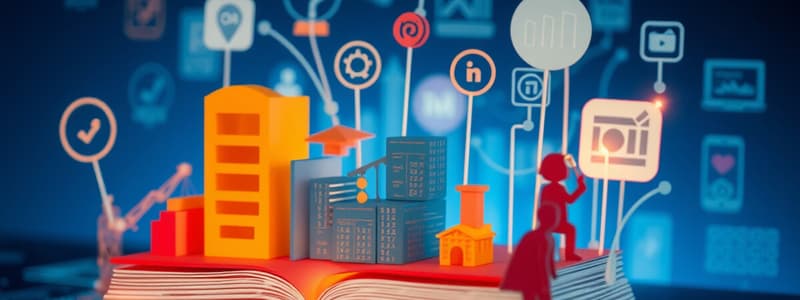Podcast
Questions and Answers
What does technology primarily aim to do?
What does technology primarily aim to do?
- Facilitate problem-solving (correct)
- Create useless products
- Limit access to information
- Make life more complicated
Which of the following is NOT a potential effect of misinformation?
Which of the following is NOT a potential effect of misinformation?
- Reinforcing false beliefs
- Causing unnecessary panic
- Improving public understanding (correct)
- Harming people's safety
What is a key characteristic of technology literacy?
What is a key characteristic of technology literacy?
- Reliance solely on printed media
- Disseminating false information
- Responsible use of technological tools (correct)
- Ability to avoid technological tools
Which invention is considered one of the greatest contributions of humankind?
Which invention is considered one of the greatest contributions of humankind?
How can the vast access to information through technology be perceived?
How can the vast access to information through technology be perceived?
Which of the following is an example of how technology has shaped communication?
Which of the following is an example of how technology has shaped communication?
Which of the following describes a negative aspect of technology use?
Which of the following describes a negative aspect of technology use?
How does the misuse of technological tools impact information dissemination?
How does the misuse of technological tools impact information dissemination?
What is the main focus of media literacy?
What is the main focus of media literacy?
Which of the following best defines communication?
Which of the following best defines communication?
How does media literacy aim to empower citizens?
How does media literacy aim to empower citizens?
What is the role of media in communication according to the content?
What is the role of media in communication according to the content?
Which of the following is NOT considered a form of mass media?
Which of the following is NOT considered a form of mass media?
What does the term 'medium' refer to in the context of media?
What does the term 'medium' refer to in the context of media?
What aspect does media literacy NOT focus on?
What aspect does media literacy NOT focus on?
What is the primary purpose of information literacy?
What is the primary purpose of information literacy?
Which statement best reflects the communication process as presented?
Which statement best reflects the communication process as presented?
Which of the following is NOT a type of communication based on channels?
Which of the following is NOT a type of communication based on channels?
What is considered plagiarism?
What is considered plagiarism?
What factor contributes to information overload?
What factor contributes to information overload?
Which of the following is an example of non-verbal communication?
Which of the following is an example of non-verbal communication?
Why is it important to follow guidelines in using information online?
Why is it important to follow guidelines in using information online?
What technique is important for organizing ideas when gathering information?
What technique is important for organizing ideas when gathering information?
What is a significant consequence of inadequate security and privacy measures online?
What is a significant consequence of inadequate security and privacy measures online?
Flashcards are hidden until you start studying
Study Notes
Media Literacy
- Ability to access, analyze, evaluate, and communicate information across various forms including print and digital.
- Mass media refers to various platforms that communicate to large audiences.
- Communication is the act of expressing or exchanging information through words, sounds, signs, or behaviors.
Communication Process
- Based on the Shannon and Weaver model from 1949.
- Involves a sender, message, medium, and receiver to facilitate information transfer.
Media Tools
- Include radio, television, computers, telephones, mobile phones, and film.
- "Media" is the plural of "medium" and acts as an instrument for mass communication.
Media Literacy Objectives
- Aims to empower individuals with knowledge and skills to engage with both traditional media and digital technologies.
- Encourages critical thinking and active engagement rather than passive consumption of media.
Information Literacy
- Encompasses abilities to recognize when information is needed and effectively locate, evaluate, and use that information.
- Involves filtering information to determine usefulness and avoiding misinformation.
Types of Communication
- Channels of communication include:
- Verbal: Oral and written communication.
- Non-verbal: Appearance, body language, and sounds.
- Based on purpose, communication can be categorized into formal and informal.
Challenges in Information Management
- Information overload can occur from an abundance of data, requiring critical assessment.
- Following legal guidelines helps prevent plagiarism, which involves using another's work without credit.
Security and Privacy
- Users often share personal information during online registrations, creating risks for identity theft.
- Hackers pose significant threats by exploiting vulnerabilities to steal information.
Accuracy and Misinformation
- Misinformation can lead to harm and safety issues for individuals and communities.
- Emphasis on maintaining quality and truthfulness in disseminating information is crucial.
Technology Literacy
- Defined as the ability to use technological tools responsibly, appropriately, and effectively.
- Technology impacts lives through advancements, both beneficial and detrimental, requiring responsible use by individuals.
The Role of Technology
- Enhancements in technology have made information and communication easily accessible.
- Highlights of significant inventions include fire, electricity, and communication devices that changed society.
Social Responsibility in Technology Use
- Technology users should engage with tools and media thoughtfully and ethically to ensure factual information dissemination.
Studying That Suits You
Use AI to generate personalized quizzes and flashcards to suit your learning preferences.




